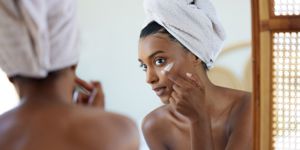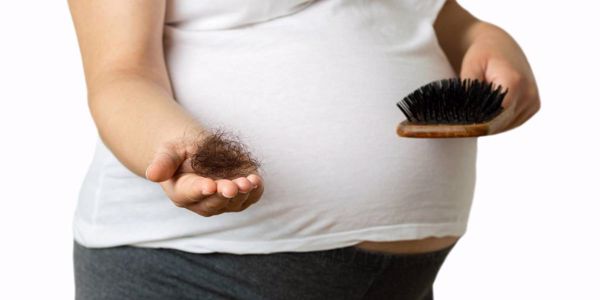You’re pregnant, congratulations! There’s a lot to think about, that’s for sure, but have you considered your skincare regime and the skincare products to avoid during pregnancy? I hate to break it to you, but there are probably a few ingredients in the products you’re using that you should ditch for now.
Anti-ageing creams, serums, moisturisers, ointments, acne solutions, nail polishes and hair treatments are all jam-packed with not-so-nice ingredients when it comes to being pregnant. Let’s take a look at the skincare products you should swerve during pregnancy.
Skincare products to avoid during pregnancy
Retinoids
I know, I know, I can’t bear it either, but it’s true. Vitamin A derivatives, like Retin-A, Retinol and Retinyl Palmitate are big no-nos. These ingredients can potentially cause birth defects, so they should be banned from your skincare regime immediately.
Here’s a quick list of some of the most common names retinoids go by: Adapalene, Tretinoin, Retinyl palmitate, Retinoic acid, Retinaldehyde, Tazarotene, Isotretinoin.
Petroleum
While it might seem harmless, petroleum-based products can be occlusive, trapping in heat and potentially harmful chemicals. Plus, they’re not the most eco-friendly option.
Petrochemicals can be found in a lot of common ingredients in beauty products. According to Karen Behnke, founder of Juice Beauty, we should be watching out for Paraffin wax, Mineral oil, Toluene, Benzene, anything with PEG (polyethylene glycol, anything with DEA (diethanolamine) or MEA (ethanolamine), Butanol and any word with butyl: butyl alcohol, butylparaben, butylene glycol, EDTA (ethylenediaminetetraacetic acid), any word with propyl—isopropyl alcohol, propylene glycol, propyl alcohol, cocamidopropyl betaine.
Did you know that Parfum or fragrance is also included in this? It’s thought that up to 95% of chemicals used in fragrance are from petroleum.
Formaldehyde
This scary-sounding chemical can be found in some nail polishes (especially shellac or gel manicures) and hair treatments. It's a known carcinogen and to be honest, sorry beautiful nails, it really should be avoided, pregnant or not.
Chemical sunscreens
Chemical sunscreens contain organic compounds like oxybenzone, avobenzone, octinoxate, and homosalate, which absorb UV radiation and convert it into heat. These ingredients can pose potential risks during pregnancy.
Some, like oxybenzone, are known to mimic oestrogen and disrupt hormone function, potentially affecting both the mother and the developing foetus. Additionally, chemical sunscreens can be absorbed into the bloodstream, with studies showing the presence of these ingredients in urine and blood long after application.
Instead, choose a mineral sunscreen with zinc oxide or titanium dioxide, as these ingredients sit on top of the skin to physically block UV rays without being absorbed, so they’re safe and effective during pregnancy.
Hair dyes and bleach
According to the NHS, most research shows that it’s safe to dye the colour of your hair, while NCT confirms that hair bleach is also fine to use and that it’s unlikely it will absorb into your body to reach your baby, unless you have broken skin. The UK government adds that exposure to hydrogen peroxide during pregnancy is not likely to cause damage to your unborn baby. That said, many experts recommend waiting until after the first trimester just to be on the safe side.
Essential Oils
Experts tend to recommend avoiding the use of essential oils during the first trimester, but there are some that are safe to use when you’re further along. Always consult with your GP or midwife if you’re unsure.
The rule of thumb is to avoid essential oils if you have a history of miscarriage, have had vaginal bleeding during your pregnancy, heart problems, diabetes, blood clotting problems, thyroid, liver or kidney disease, high or low blood pressure, and asthma or a respiratory condition.
High Doses of Salicylic Acid
High doses of salicylic acid, often found in strong acne treatments should be avoided during pregnancy. They can soak into your skin and might cause issues. Stick to low concentrations (like 2% or less) if you really need them, but check with your doctor first to be safe.
Parabens
During pregnancy, it's wise to be cautious with products containing parabens due to concerns about their potential effects on hormone levels. Some studies have suggested links between prenatal exposure to parabens and adverse effects on reproductive health and development in babies.
It’s not always obvious if your products contain parabens. When you’re looking at labels, watch out for butylparaben, methylparaben and propylparaben – the most common found parabens.
Hydroquinone
This ingredient reduces dark spots, melasma, freckles, age spots, and post-acne pigmentation. Hydroquinone is highly absorbable, so it’s recommended to avoid this skincare product during pregnancy.
Botox and fillers
Right now, there’s no evidence to suggest that Botox and fillers cause harm during pregnancy, but because there is such a lack of research, the advice is to avoid using these until after pregnancy. Ouch – for us older mums.
Should You Continue to Avoid These Skincare Products After Giving Birth?
Okay, so we've covered skincare products to avoid during pregnancy, but did you know that you'll probably have to continue to swerve all of the above ingredients until you've finished breastfeeding? This is because some ingredients can be transferred via breast milk. Retinoids, for example, should still be avoided if you're breastfeeding. It's always a good idea to consult your healthcare provider about any skincare concerns postpartum. As a rule of thumb, erring on the side of caution is wise when it comes to your little one’s health.
Are There Any Alternative Products That Have the Same Purpose but Without the Chemicals?
Here are some pregnancy-safe alternatives:
- Anti-aging: You can still use vitamin C serums, niacinamide, and hyaluronic acid. These are great for keeping your skin plump and bright without the risks.
- Acne: Opt for products with glycolic or salicylic acid (in small amounts). These can help safely prevent breakouts.
- Moisturising: Look for natural oils like coconut oil, shea butter, or products labelled as mineral oil-free. As previously mentioned, when it comes to sunscreens, opt for mineral based products.
- Nail polish: Choose non-toxic, breathable nail polishes – there are lots of great brands out there.
Final Thoughts
Navigating skincare during pregnancy doesn't have to be daunting. By making informed choices, you can keep both you and your baby safe while maintaining that pregnancy glow. Here’s to a healthy, happy pregnancy and a radiant you!







